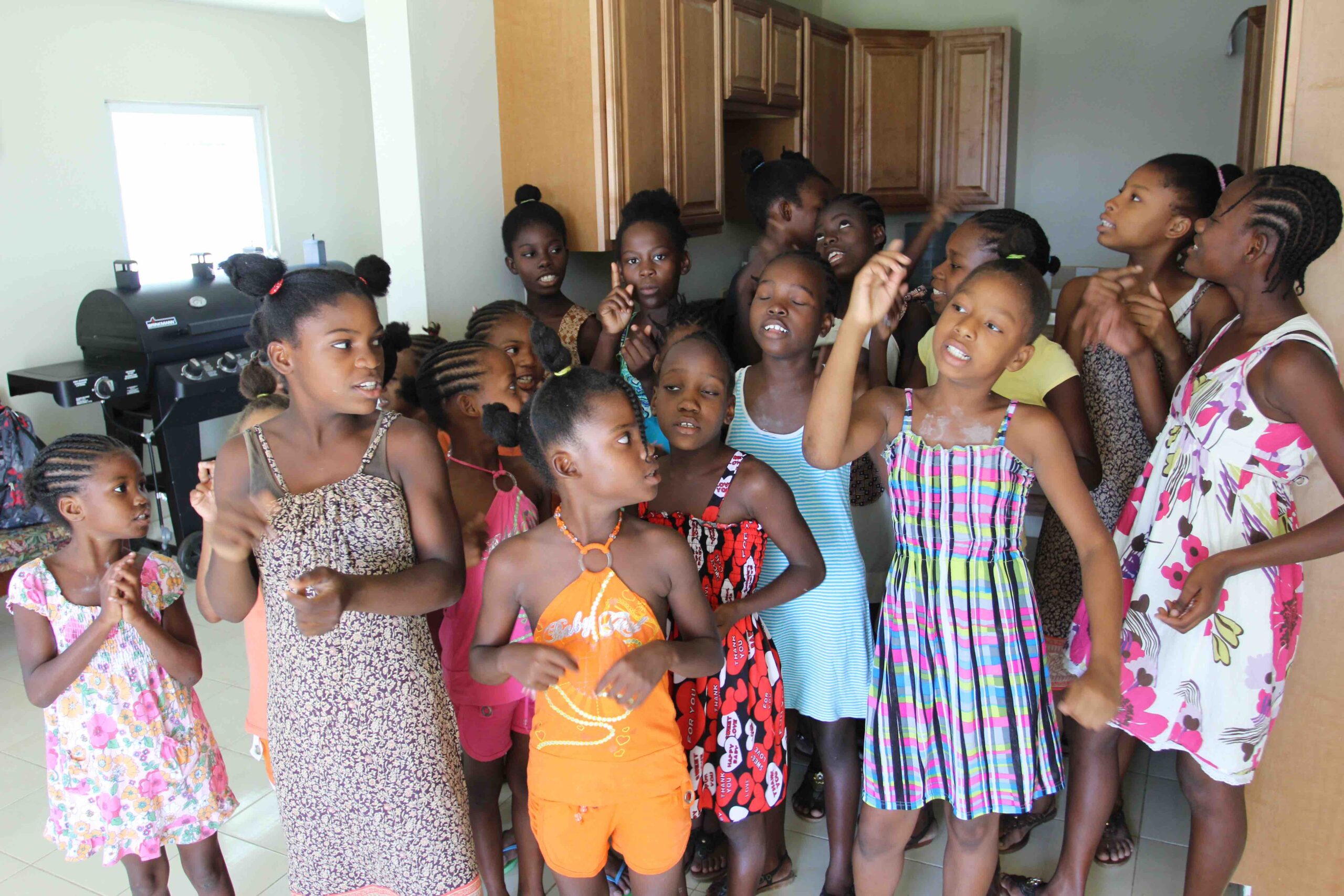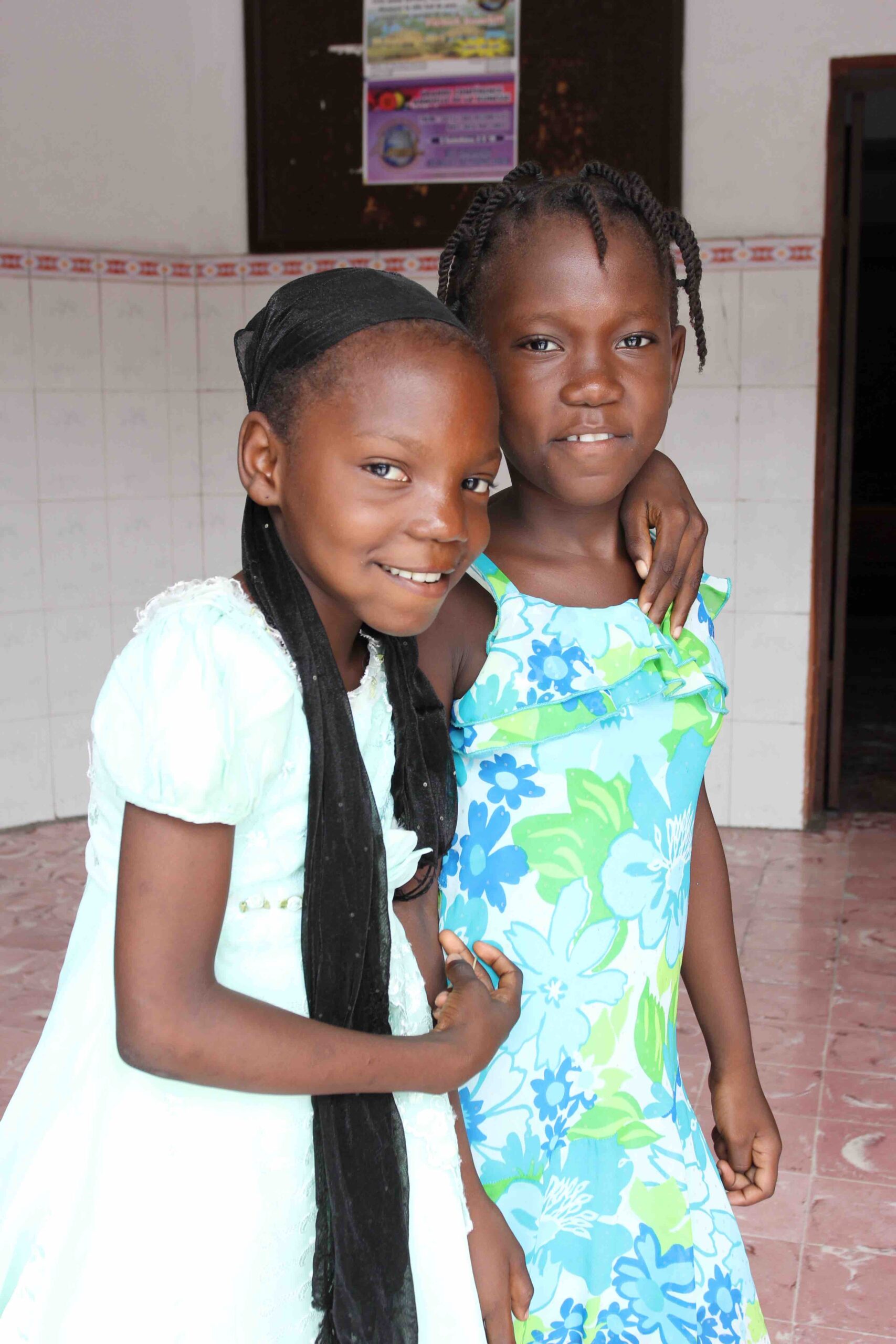BISHOP LEON PAMPHILE
The nonprofit is still planting rainbows—helping Haitians rise above to embrace literacy, health, and hope.
by Ervin Dyer, Ph.D.
For New Pittsburgh Courier
It is one of those days where hot just gets hotter in north-central Haiti. To stand is to sweat. Under endless blue sky and scorching September sun, the bishop’s car pulls up to the girls’ orphanage, a modest structure planted in the flatlands of Croix des Bouquets, a community just outside of Port-au-Prince, Haiti’s capital city. As the bishop steps into 90-plus degree heat, he wipes his brow. Before long, a young girl, her pigtails wrapped in pink ribbons, runs to give him a hug. After her, comes another in tangerine-colored shorts, then another in a bright floral dress—all of them running to greet the tall, dark visitor. Soon, there is a rainbow of girls surrounding Bishop Leon Pamphile, whose arms reach to accept them all. If he could, he’d lift every girl, shouldering them toward the sky, away from the cares of this Earth.
Inside the orphanage, the girls sing to the bishop and pray with him. He beams, like a proud father, and doles out a little encouragement: “God and education,” he says, “are the ways to succeed in life.”
For Pamphile, faith and education are the twin rungs that lifted him out of an isolated mountainous village near Port-au-Prince to become a teacher, a scholar, a bishop with the Pentecostal church, and a philanthropist. Pamphile is a founder of the Functional Literacy Ministry of Haiti (FLM Haiti), a Pittsburgh-based nonprofit that partners with the people and institutions of Haiti to help the Haitians help themselves. On Oct. 28, at “The Power of Love” gala and dinner, FLM Haiti celebrated 40 years of its mission outreach.

KIDS IN HAITI (PHOTOS BY KENNETH NEELY)
By almost every measure, Haiti’s 10 million people face severe, complex realities. Eighty percent live on $1.25 a day or less; only 53 percent of the population over age 15 can read or write, and public education reaches only 20 percent. Nearly three-quarters of the Caribbean nation’s people don’t have jobs. The nation is burdened by malnutrition, lack of access to clean water, and inadequate public health facilities. In recent years, an uptick in political and social unrest has exacerbated these conditions.
Pamphile understands the challenges. He grew up in a small stone home in the valley of Laboule, located south of Port-au-Prince. The home had no electricity. Every morning, he woke in the dark, finished his breakfast of bread and tea, and began the long walk to his two-room primary school. Every day was an uphill climb to escape the grind of poverty.

KIDS IN HAITI (PHOTOS BY KENNETH NEELY)
Pamphile mounted the hills on the conviction of his mother, Francillia. “My son is intelligent,” she said of her first born of 10 children. “He will use his education to get something done.” Before long, he was noticed by the local schoolmaster who encouraged Pamphile’s father to send his son 25 miles away to the all-male secondary school, Lycee Petion. The school was brimming with young scholars eager to soak up knowledge.
The city was an awakening for Pamphile. The messages from the radio and words in the newspapers introduced him to views on communal health, education, and Pan-Africanism. But he also observed overcrowding, class divisions, the political system being used for personal gain and not the common good, and—in the vast street markets—the enterprising spirit of Haitians trying to lift themselves up from poverty.
Pamphile enrolled at the University of Haiti, where he studied to be a teacher. In the morning, he worked in a church school in a slum and went to classes at night. When he graduated, he taught for two years in a private secondary school in Petion-Ville.
Life was sunnier for Pamphile, but he began to worry about his future. Increasingly, he felt the calling to use all that he had acquired and learned to care for family and community. After all, he was the dutiful elder son of a minister. During his youth, he had recited scripture, taught Sunday school, and was the translator when missionaries came to town. “My father groomed me to be a preacher,” says Pamphile, “and I have always been a servant.”
That personal mission of service was reinforced when, while serving in Haiti as a translator for visiting missionaries, he was recruited to attend the Pittsburgh Theological Seminary. He arrived in a snowy Pittsburgh in December 1970, at age 28. It was a new beginning for the teacher and his wife, Rozelle, a soft-spoken, dark-haired woman who herself had triumphed over being an orphan. Soon, Pamphile was busy: He took seminary classes, and he earned a master’s degree a and Ph.D. in education from the University of Pittsburgh.
With all that he had, Pamphile thought he could do more to help Haitians. Drawing support and resources from a vast network of friends, immigrant Haitians, and volunteers, he launched FLM Haiti in 1983.
“I was socially minded. So, I felt I could change things,” says Pamphile about tackling the tough challenges in Haiti. Initially, he focused on literacy. He used his network of advocates to raise funds to hire teachers to help Haiti’s most vulnerable citizens to write their own names. If they could write and read, he envisioned, they could vote, fill out a job application, and pass on the love of learning across generations.
He began with five literacy centers and 300 people. There are now more than 70 centers and thousands have graduated. On land donated by his father, he built a school, which now has 600 students and teaches grades K-13. Then, his dream expanded.
Not far away, on a hill in the thick green arms of the valley, he built a clinic, The House of David, named to honor a Pittsburgh-area Presbyterian minister who helped Pamphile build the site, brick by brick. In the early years, twice a year, mission teams came to treat the sick and educate the needy. Now, the clinic has a full-time staff and serves some 30,000 people. In fall 2013, Pamphile opened the Excelsior Technical Institute with programs in construction and computer technology. Today, a sister organization, the Alliance d’ Action Chretienne, is a partner in these efforts.
After 40 years, “we’re not finished yet,” says Pamphile, who with the courage of his Haitian partners and the local community has managed to keep FLM Haiti’s clinic open and its schools functioning during some of Haiti’s recent darkest days of gang activity and social turmoil. For Pamphile, the sun always shines and there’s always reason to reach for a rainbow.
(Editor’s note: This article is adapted from “Valley of Hope,” first published in Pitt Magazine at the University of Pittsburgh.)